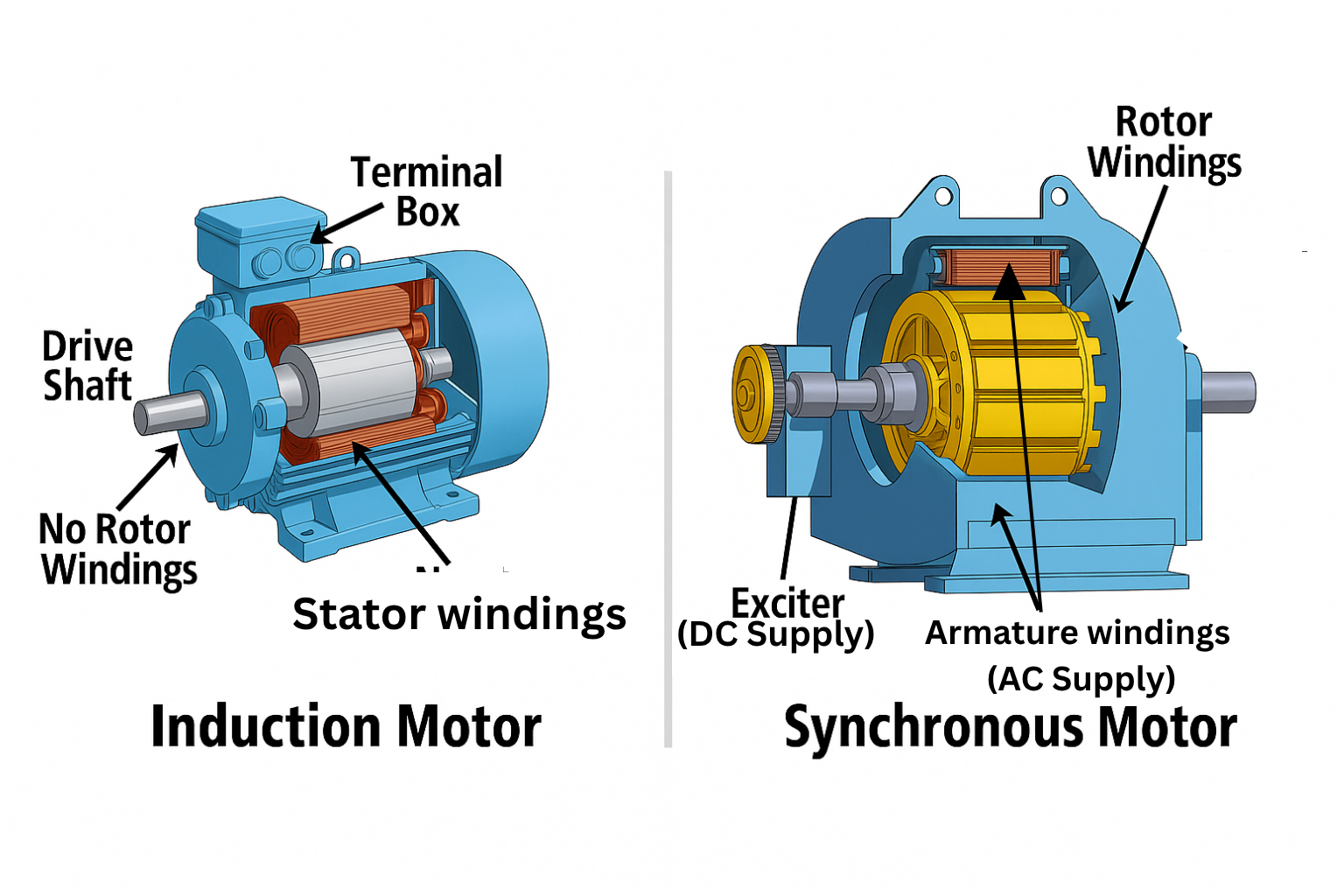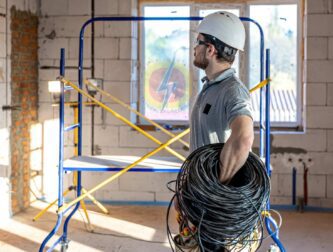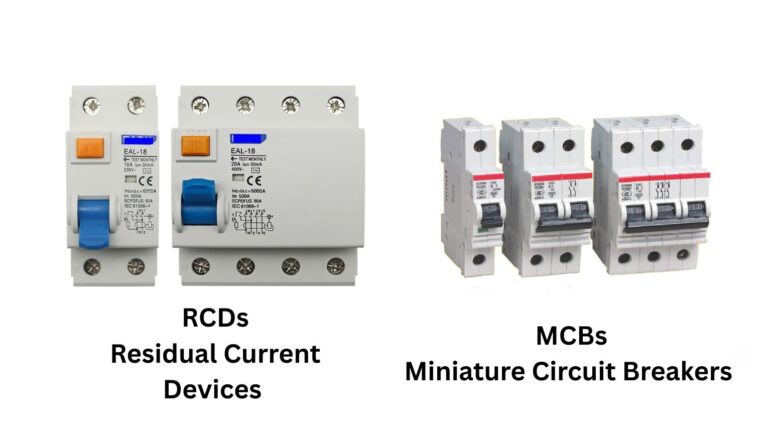Home / Blog Posts / The difference between RCDs and MCBs
Residual Current Devices RCDs and Miniature Circuit Breakers MCBs perform separate safety roles in your home. An MCB protects wiring from overloads and short circuits. An RCD protects you from electric shock by cutting power when it detects current leakage. You need both devices for full protection in any modern installation.
You rely on electrical protection to keep risk low in your home. Naturally, you need to protect yourself. However, you also need to protect your wiring. Many people mix up Residual Current Devices (RCDs) and Miniature Circuit Breakers (MCBs). In reality, they do very different jobs. Furthermore, these roles never overlap. As a result, you need both devices in every modern installation.
A Miniature Circuit Breaker (MCB) cuts power when the current rises above a safe level. Typically, you may see ratings like 6A, 20A, and 32A. Generally, you fit lower ratings for lighting (8-10 bulbs with 100w), while higher ratings are used for cookers or showers.
So, an MCB gives you double protection – it’s like having a safety net for your wiring. First, it has a thermal element that kicks in when there’s an overload, and then there’s a magnetic element that’s super quick to respond to short circuits. Together, they keep your wiring from overheating and reduce the risk of insulation failure – pretty neat, right?
But here’s the thing: an MCB won’t protect you from electric shock. It only reacts to high fault currents, so if you touch a live conductor and the leakage current is low, the MCB won’t trip. That’s why it’s super important to be careful around electricity.
So, a Residual Current Device (RCD) is like a vigilant guardian – it constantly checks the incoming and outgoing current, and if they don’t match, it knows there’s earth leakage and cuts the power instantly. This lightning-fast response is what protects you from electric shock. A 30 mA device, for example, trips before the current through your body reaches a dangerous level.
You typically use RCDs in areas where the risk is higher, like bathrooms or outdoor equipment. You can have a fixed RCD installed in your consumer unit, or use a portable one for tools and temporary setups – it’s a simple but effective way to add an extra layer of protection.
You can compare both the RCDs and MCBs devices in a simple way. Here is a clear view.
| Feature | Miniature Circuit Breaker MCB | Residual Current Device RCD |
|---|---|---|
| Primary purpose | Protects wiring and equipment | Protects people |
| Trigger | Excess current | Current imbalance |
| Sensitivity | Amps | Milliamps |
| Speed | Varies | Very fast |
| Fault type | Fire and wiring risk | Shock risk |
You can now see the core point. An MCB will not trip for a small leakage fault. An RCD will cut power instantly.
So, why do you need both? Well, an MCB handles overloads and short circuits, while an RCD handles earth leakage. They’re like two pieces of a puzzle – each one protects against a different type of fault, so you get full protection only when they’re both there.
Using both devices means you’re less likely to have cable fires or get injured or electrocuted. It’s like having a solid safety net in your home – you can feel more confident and secure.
There’s also a handy option called an RCBO – it’s a single device that combines overcurrent protection and earth leakage protection in one unit. This means you save space in your consumer unit and simplify your circuit layout, making it a neat and efficient solution.
In the UK, wiring standards typically require 30 mA RCD or RCBO protection for many circuits, especially in high-risk areas. If you’re unsure about your installation, it’s best to consult a qualified electrician – they can check it out and give you peace of mind.
It’s a good idea to test your RCDs regularly – try pressing the test button a few times a year. The device should trip straight away. If it doesn’t, it’s time to call an expert electrician to take a look.
RCDs save lives, while MCBs protect your wiring – they’re both crucial, but serve different purposes. Don’t think one can replace the other; your home really needs both to stay safe.
Trustindex verifies that the original source of the review is Google. I hired a licensed electrician from mega solution electrical in Kumasi, the service was done professionally and met all standards. It gave me peace of mind. I will recommend them to every bodyPosted onTrustindex verifies that the original source of the review is Google. They’re the best and most reliable electrical company in Ghana I’ll always recommend them to everyonePosted onTrustindex verifies that the original source of the review is Google. Thanks for solving our electrical problem so fast, coming all the way to Cantonments.Posted onTrustindex verifies that the original source of the review is Google. Mega Solution demonstrates exceptional expertise in genset systems. Their professionalism, technical proficiency, and industry experience set them apart. I highly recommend their services to anyone seeking reliable and knowledgeable partners in this field.Posted onTrustindex verifies that the original source of the review is Google. This best experience I had in a while, Richard provided all the help I was looking for. Thank you, this is a 10 Stars service!Posted onTrustindex verifies that the original source of the review is Google. Best electrical company in GhanaPosted onTrustindex verifies that the original source of the review is Google. Best Electrician in Ghana | best electrical engineer at good location | over 30 years experience | good electrical service. Thank you so much. I’m very happyPosted onTrustindex verifies that the original source of the review is Google. Wonderful work you have to try
When searching for a reliable electrician, call us at +233 24 415 1232 We specialize in electrical repairs, indoor and outdoor lighting installations, panel upgrades, and even hot tub wiring!
No matter urgent any electrical repairs seem, it’s never okay to attempt to handle them on your own. Trying to take care of electrical problems without professional training is extremely dangerous. If you or someone else aren’t hurt during your attempt, there’s still a chance that you’ve left something undone that poses a huge risk to you, your home, or your family.
mega solution electrical Power and wiring audit in Accra, Ghana knows what a hassle any electrical problems can be, which is why we’ll always respond to any requests for service as quickly as possible. And because all of our technicians are licensed, background checked, and professionally trained, you’re guaranteed to receive the best quality service and workmanship available when you call us. We can assist with all your electric needs including:
| M | T | W | T | F | S | S |
|---|---|---|---|---|---|---|
| 1 | 2 | 3 | 4 | |||
| 5 | 6 | 7 | 8 | 9 | 10 | 11 |
| 12 | 13 | 14 | 15 | 16 | 17 | 18 |
| 19 | 20 | 21 | 22 | 23 | 24 | 25 |
| 26 | 27 | 28 | 29 | 30 | 31 | |

Learn how to read and understand circuit breaker ratings like In, Icu,

Discover the key differences between synchronous and induction motors.

What safety measures you need to put in place in your industry and why

As energy bills continue to soar, households and businesses alike are

Dreaming of a Career as an Electrician in Ghana? Here's How to Make It

Characteristics of Top Electricians Before starting your search, it's


